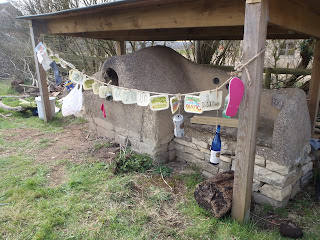 This week pupils from Bishop Sutton Primary School will begin creating a film about their local landscape and the people that work within it and shape its future.
This week pupils from Bishop Sutton Primary School will begin creating a film about their local landscape and the people that work within it and shape its future. Filming will be taking place at Folly Farm and The Community Farm this Tuesday where they will be talking to Andy (a community farm grower), Alex (a charcoal maker) and Jo (Folly Farm).
The project is led by the Wildschools team from Avon Wildlife Trust and is funded by Mendip Hills AONB
The story so far . . .
Our film-makers have already explored Folly Farm and The Community Farm and learnt about the terminology and key features of the landscape such as habitats, wildlife corridors, pollination, organic farming, succession and natural boundaries.
 The Community Farm is an organic,
The Community Farm is an organic, not-for-profit growing community that helps its members to farm in a sustainable way. It also aims to reconnect people with where their food comes from and what it takes to produce it making it an ideal location for our film crews to do some research.
Now armed with an understanding of the landscape they are ready to meet the locals!
Filming rolls into action . . .
To do this they will be hosting a tea party and inviting along some of the local people that live and work in the area. Some future interviewees lined up include a phd student studying cowslips, local fishermen, farmers and local residents. Each with a different view and experience of the landscape which our pupils will use to build a picture of how the landscape was used in the past, now and how that might change in the future.
Our Yr 4 and 5 pupils from Bishop Sutton Primary have been taking the filming process very seriously and have assigned specific roles within the groups such as director, producer, scriptwriter, narrator/presenter, sound person, photographer and (last but not least) camera operators.
The children have really taken ownership of their films and devised their own questions to put to the interviewees. They intend to find out what makes this landscape tick and will be investigating the story of this landscape and how important it is to us and wildlife.
Still to come . . .
Don't miss our film-makers visit a working farm/nature reserve to get an insight into the future of farming!
Our young film crews will be visiting Burledge Hill which is an Avon Wildlife Trust nature reserve and working farm with part of it designated as an SSSI. This is a special site that is managed sympathetically towards wildlife and conservation in such a way that supports being a business too. By encouraging a variety of species and rich grasslands they in turn can feed their cattle with a highly nutritious diet that improves the quality of their stock.
More updates on the making of this film to follow!


















